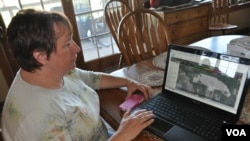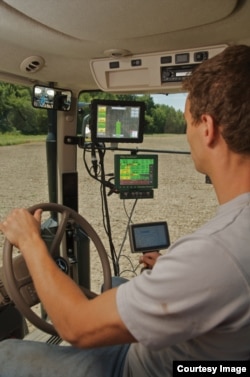ST. LOUIS, MISSOURI —
Farmers increasingly rely on technology to reduce their costs and improve their yields and profits.
Along with high-tech machinery, farmers are trying out agribusiness services that promise to turn data about their farms into higher returns.
The Finfrocks farm about 3,200 hectares of corn and soybeans in central Illinois in the U.S. Midwest. It’s a family operation ― the couple runs it with just their son and one employee.
To farm all that land with four people, the Finfrocks use some pretty high-tech equipment.
The tractor is attached to a planter that can seed 48 rows at a time - that’s a 24-meter swath, on one pass through the field. And on the straightaways the tractor can steer itself.
But Shelley Finfrock says there’s one thing no amount of technology can control.
Tracking rainfall
“Weather’s probably the most important thing, and the most uncontrollable thing,” she said.
Finfrock says weather affects every aspect of a farmer’s operation: from soil fertility, to pests and weeds, to yields and profits.
The soil in the field behind Finfrock’s house looks and sounds dry. But below the surface, there's just enough moisture for corn seeds to sprout.
The problem is rainfall varies a lot ― even from field to field. And because the Finfrock farms are spread out across five counties, they can waste a lot of time driving out to a field, only to find out when they get there it’s not fit to plant.
So for the past year, Finfrock has been beta-testing an online service called Climate Basic.
Every morning at about 4:15 a.m., the service sends her an SMS text message listing the family farms and how much rain each one received in the past 24 hours ― down to hundredths of a centimeter.
“We have a farm from where we’re sitting right now, just a mile south, and it’ll say it was dry, and you got a good half inch rain [up here], and you go down there and it’s dry," she said. "So it was a pretty good tool to use.”
But giving farmers that kind of precise weather information takes lots of data.
“We are dealing every day with more than 10 million points for precipitation, updated on an hourly basis,” said Tristan D’Orgeval who is with Climate Corporation, developer of Climate Basic.
He says the company uses data from the U.S. National Weather Service and other sources, some public, some private. “Including radar, rain gauges and satellites, to have the best picture of the rainfall on a field-per-field basis.”
Agricultural advisor
Climate Corporation has set itself a lofty goal: to help “all the world’s people and businesses manage and adapt to climate change.”
The paid, "Pro" version of its software just launched this year. It aims to give farmers advice about all aspects of their operations: what to plant, when to apply fertilizers and pesticides, and even how much money they can expect to make off their crop.
Agricultural advising isn’t new. People like Eric Gordon have been doing it for a long time.
“I’m on the phone with several of my farmers two and three times a day during planting season. It’s a people business,” he said.
Some of his older colleagues worry technology might make human crop advisors obsolete, but he doesn’t think so.
“I don’t see it as a replacement. I see it as a tool to make us better, more efficient,” he said.
Climate Corporation’s D’Orgeval agrees. He says the computer models are only as good as the data that people put into them. That means the company needs detailed information about each farm ― things only the farmer would know.
“That’s why I think it’s very important for us to have very clear guidelines and principles with what we do with farmers’ data,” he said, adding that Climate Corporation keeps that information confidential.
Privacy concerns
But farmer Shelley Finfrock is wary of how much data she should really share.
“Because of competition, and because of…having big brother watching, I don’t know how else to put it,” she said.
In this case, “big brother” is Monsanto, the agricultural biotech seed giant that acquired Climate Corporation last fall for close to a billion dollars.
As apprehensive as farmers may be about their data being misused, an increasing number seem willing to take the risk.
According to Monsanto, they’re already using Climate Pro on more than 400,000 hectares. And the company plans to keep expanding: from corn to soybeans, and then to other crops, here in the U.S. and internationally.
Along with high-tech machinery, farmers are trying out agribusiness services that promise to turn data about their farms into higher returns.
The Finfrocks farm about 3,200 hectares of corn and soybeans in central Illinois in the U.S. Midwest. It’s a family operation ― the couple runs it with just their son and one employee.
To farm all that land with four people, the Finfrocks use some pretty high-tech equipment.
The tractor is attached to a planter that can seed 48 rows at a time - that’s a 24-meter swath, on one pass through the field. And on the straightaways the tractor can steer itself.
But Shelley Finfrock says there’s one thing no amount of technology can control.
Tracking rainfall
“Weather’s probably the most important thing, and the most uncontrollable thing,” she said.
Finfrock says weather affects every aspect of a farmer’s operation: from soil fertility, to pests and weeds, to yields and profits.
The soil in the field behind Finfrock’s house looks and sounds dry. But below the surface, there's just enough moisture for corn seeds to sprout.
The problem is rainfall varies a lot ― even from field to field. And because the Finfrock farms are spread out across five counties, they can waste a lot of time driving out to a field, only to find out when they get there it’s not fit to plant.
So for the past year, Finfrock has been beta-testing an online service called Climate Basic.
Every morning at about 4:15 a.m., the service sends her an SMS text message listing the family farms and how much rain each one received in the past 24 hours ― down to hundredths of a centimeter.
“We have a farm from where we’re sitting right now, just a mile south, and it’ll say it was dry, and you got a good half inch rain [up here], and you go down there and it’s dry," she said. "So it was a pretty good tool to use.”
But giving farmers that kind of precise weather information takes lots of data.
“We are dealing every day with more than 10 million points for precipitation, updated on an hourly basis,” said Tristan D’Orgeval who is with Climate Corporation, developer of Climate Basic.
He says the company uses data from the U.S. National Weather Service and other sources, some public, some private. “Including radar, rain gauges and satellites, to have the best picture of the rainfall on a field-per-field basis.”
Agricultural advisor
Climate Corporation has set itself a lofty goal: to help “all the world’s people and businesses manage and adapt to climate change.”
The paid, "Pro" version of its software just launched this year. It aims to give farmers advice about all aspects of their operations: what to plant, when to apply fertilizers and pesticides, and even how much money they can expect to make off their crop.
Agricultural advising isn’t new. People like Eric Gordon have been doing it for a long time.
“I’m on the phone with several of my farmers two and three times a day during planting season. It’s a people business,” he said.
Some of his older colleagues worry technology might make human crop advisors obsolete, but he doesn’t think so.
“I don’t see it as a replacement. I see it as a tool to make us better, more efficient,” he said.
Climate Corporation’s D’Orgeval agrees. He says the computer models are only as good as the data that people put into them. That means the company needs detailed information about each farm ― things only the farmer would know.
“That’s why I think it’s very important for us to have very clear guidelines and principles with what we do with farmers’ data,” he said, adding that Climate Corporation keeps that information confidential.
Privacy concerns
But farmer Shelley Finfrock is wary of how much data she should really share.
“Because of competition, and because of…having big brother watching, I don’t know how else to put it,” she said.
In this case, “big brother” is Monsanto, the agricultural biotech seed giant that acquired Climate Corporation last fall for close to a billion dollars.
As apprehensive as farmers may be about their data being misused, an increasing number seem willing to take the risk.
According to Monsanto, they’re already using Climate Pro on more than 400,000 hectares. And the company plans to keep expanding: from corn to soybeans, and then to other crops, here in the U.S. and internationally.











